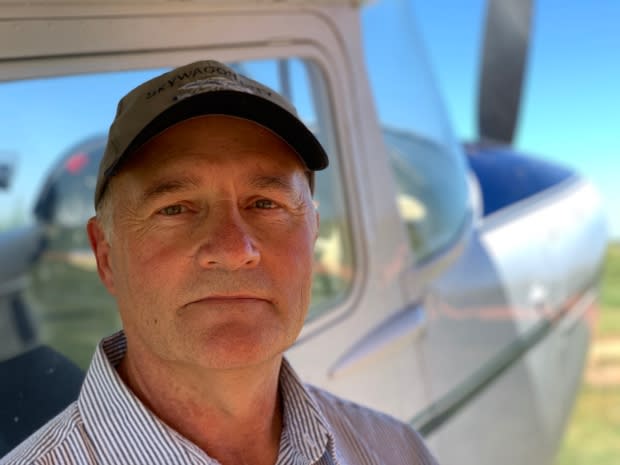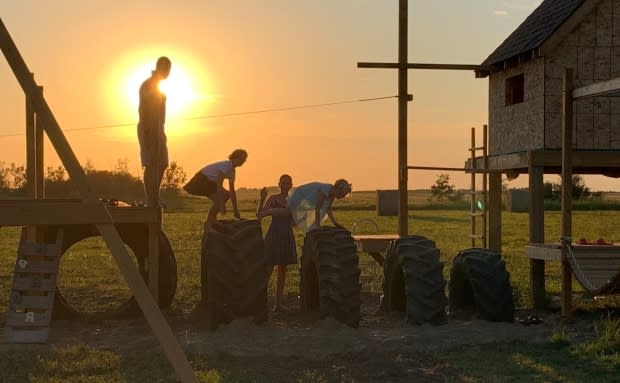Alberta community's concerns about wind farm echo familiar challenges of Canada's energy transition
Chris Blumhagen was working on his organic farm in central Alberta when Capital Power called to sell him on the idea of putting a wind turbine on his land.
Blumhagen says the representative from the company pushed hard, telling him his neighbours were already on board with a plan to build 74 turbines in the 100 square kilometre area and that if he didn't sign on, he would miss out.
So Blumhagen signed in exchange for $10 and a promise of more to come once the turbines started spinning, only to later learn that many of his neighbours hadn't done the same.
"They essentially tricked me," he said.
That was 2015. Since then, Blumhagen and his neighbours have banded together to oppose the project, alleging dishonest tactics by the company in promoting the project to residents and risks to their health, land and livelihoods if it goes forward.
Edmonton-based Capital Power, which operates coal, natural gas and wind power facilities in Alberta, and Alberta's utilities commission say all the residents' concerns have been addressed.
This is the view from the rural front lines of Canada's energy transition — a move away from fossil fuels toward renewable energy that a majority of Albertans say they support but that few in the country's cities will have to deal with head-on.
Not opposed to wind power
That will be left to people like Blumhagen and his neighbours, who live on a sliver of Alberta prairie about 200 kilometres outside of Edmonton, wedged between the Battle River Valley to the north and the Paintearth Coulee to the south.
Locals call it "the island," and a handful of families have lived here for more than a century, farming and ranching together.

Along with agriculture, power generation has long been a part of daily life in Paintearth County. The area saw first the dawn of the coal industry and then the rise of the oil and gas industries in Alberta. Oil wells still draw black gold from the earth here, and a coal mine and power plant still operates in the area.
Blumhagen says that experience is why most residents aren't against the idea of wind power or other forms of renewable energy.
"Wind has its place," he said.
But Blumhagen says Capital Power, which already operates one wind farm in the area, near the village of Halkirk, has not taken the time to listen to the concerns of residents.
Residents like Gerard Fetaz, whose family has lived here since 1904. Fetaz's concerns about the project are easy to see. He has a small runway on his property that he uses to fly his vintage 1957 Cessna. He used to make some money crop dusting in the area, though these days he flies just for the love of it.
But that passion may be grounded for good if Capital Power's wind farm is built. The plans would see a turbine just 650 metres from his landing strip, despite recommendations from Transport Canada that turbines should be at least four kilometres from a runway.

"It's not safe," said Fetaz. "Somebody runs into a turbine, or gets caught in the turbulence or something — you could hit somebody's house."
He says he has tried to reach out to Capital Power about finding a different location for the turbine but says "they aren't interested in talking about it at all."
24 conditions placed on project
Capital Power didn't agree to an interview with CBC News, but in a statement, the company denied that it ignored the concerns of residents and said it would act with "integrity, work to address stakeholder concerns and abide by all laws and regulations governing the project development process."
But Fetaz and others in the area say the rush to embrace sustainable energy has meant that their concerns have been passed over. Since the project was given the green light in 2018, local residents have challenged its approval at several levels, including at the Alberta Court of Appeal and, most recently, at the county, but to no avail.
The province is moving ahead with wind power, with Alberta Electric System Operator, which oversees Alberta's electricity grid, predicting that the amount of wind power generated in Alberta will double over the next decade.
The Alberta Utilities Commission, the regulator that approved the Capital Power project, says it is in the public interest.
The AUC's Jim Law says every effort was made to accommodate the residents, including putting 24 conditions on the project's approval, which the company must meet to complete it.
Among them, a commitment to move the turbine near Fetaz's runway by up to 50 metres and to make sure that any environmental impacts are mitigated.

"Those are in place to directly answer some of the concerns that the intervenors had about the project, and they range from airport considerations to wildlife and noise," Law said.
Law said that, unlike with oil and gas developments, no one can be forced to have a wind turbine on their land in Alberta,
"There's no forced entry. It's a voluntary agreement," he said.
Law says the system is set up to make sure the public interest is served and that the concerns of the land owners are respected and that it generally works.
'Backlash' in Ontario
That's not how Katrina Smith sees it. Three turbines will be visible from Smith's home, which sits just down the road from those of her parents and brothers. Smith likes the idea of renewable energy; her home is completely off-grid, powered by a solar array in her backyard.
But she has concerns about how a large wind farm will impact the sensitive wetlands near her home and the community she grew up in. She sees a push to meet the green energy needs of urban Canada on the backs of rural communities like hers.
"There has to be mutual respect. There has to be an appreciation for what is already there," she said. "There has to be a goal for what we can maintain and sustain for the future."
Dayna Scott says similar concerns about the location of turbines and their impact on residents and the environment were raised in rural Ontario more than a decade ago, when that province moved to embrace wind power.
Scott, who holds a research chair in environmental law and justice at York University in Toronto, says that residents were not consulted adequately in Ontario and that ignoring local concerns caused "a huge amount of backlash in rural communities."
Scott worries that repeating those mistakes in other parts of Canada could slow a shift toward green energy.
That situation may already be playing out back on "the island." Local opposition and a sluggish economy mean the future of the wind farm is in limbo. Capital Power has yet to start construction on the project, which it has until December 2022 to finish.
That's welcome news for many of the residents in the area if not for Canada's shift to a lower-carbon future.


